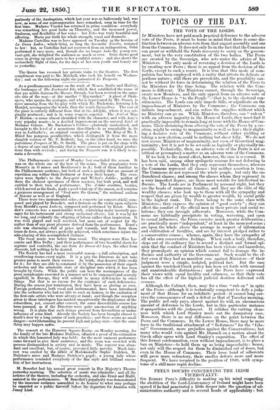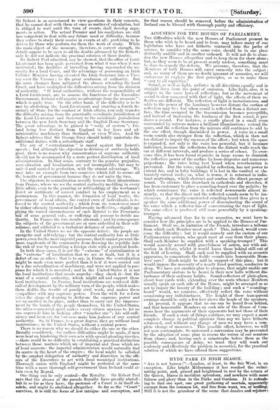PEEL'S DOUBTS CONCERNING THE IRISH VICEROYALTY.
Sin ROBERT PEEL'S difficulty in making up his mind respecting the abolition of the Lord-Lieutenancy of Ireland might have been spared if, he had penetrated a little deeper into the question of ad- ministrative authority and its several heads of applicability : but
Sir Robert is so accustomed to view questions in their concrete, that he cannot deal with them at once as matter of calculation, but is obliged to wait until the turn of events shall develop argu- ments in action. The actual Premier and his coadjutors are still lees competent to deal with any future need or difficulty, because they refuse to study their course in events at all ; preferring to be driven by those who perform for them the work of study. While the main object of the measure, therefore, is correct enough, its details appear to be open to all the doubts advanced by Sir Robert ; only he did not indicate the practical solution of those doubts.
Sir Robert Peel admitted, nay he showed, that the office of Lord- Lieutenant has been quite perverted from what it was when it was instituted ; the facilities of travelling having superseded the ne- cessity for a local Court, and the advantage of possessing an Irish Cabinet Minister having elevated the Irish Secretary into a Vice- roy over the Viceroy ; to the great confusion of authority. But the same changes have mitigated the abuses attending the local Court, and have multiplied the difficulties arising from the division of authority. " If local authorities, without the responsibility of a Lord-Lieutenant, are to assume the functions of the Executive Government, Ireland will acquire no advantage from the measure " : which is quite true. On the other hand, if the difficulty is to be met by abolishing the Lord-Lieutenant and erealing a fourth Se- cretary of State for the conduct of Irish affairs, you only transfer the difficulty arising from the practically coordinate jurisdiction of the Lord-Lieutenant and Secretary to the coordinate jurisdiction between the new Irish Secretary and the English Home Secretary. The great advantage to be gained is " unity of system "; Ire- land being less distinct from England in her laws and ad- ministrative machinery than Scotland, or even Wales. And Sir Robert advises that Sir George Grey should boldly undertake the additional duties, with a subordinate staff.
The cry of " centralization " is raised against Sir Robert's speech : but although the objection to division of authority holds good, there is no reason why concentration of supreme authority should not be accompanied by a more perfect distribution of local administration. In that sense, contrary to the popular prejudice, oentsdization and localization are not incompatible, but may be united and carried to perfection, with the utmost advantage. We may take an example from two countries which fail to secure all the benefits of government because they do not unite the two.
The objectors to centralization usually borrow their illustrations from France, where we see the central authority meddling in every little affair, even to the granting or withholding of the workman's livrct or certificate of correct conduct in his employment as a journeyman. In this manner, the formation of local works, the government of local affairs, the control even of individuals, is re- ferred to the central authority ; which from its remoteness must be either odiously tyrannical or ludicrously ineffective,—rigidly ap- plying the varied circumstanees of each district to the Prometstes bed of some general rule, or suffering all persons to deride au- thority. In France the two results alternate; and by consequence the subjects of the government are at once enfeebled in their self- reliance, and addicted to a turbulent defiance of authority.
In the United States we see the opposite defect : the people are energetic and self-relying; but the central authority has so little power,even for the most imperial purposes, that it cannot prevent the mere vagabonds of the community from drawing the republic into the risk of war by assaulting a foreign state with a piratical horde.
In both these cases, it is not the " extreme " of centralization or the " extreme " of localization that we see at fault, but it is a defect of one or other : that is to say, in France the centralization might be made even more perfect than it is if it were carried out by a due subordination of machinery, and were not applied to pur- poses for which it is unsuited ; and in the United States it is not the local institutions that create anarchy—they, check it—but the want of a central authority, which might aid and support those local institutions. In France, local institutions are rendered diffi- cult of development by the military turn of the people, which makes them dislike the trouble of purely civil work, and makes them sympathize with any supreme power. Even the wish for reform takes the shape of desiring to dethrone the supreme power and set up another in its place, rather than to carry out the improve- ment by the hands of the people themselves. In the United States, the ultra-commercial spirit makes every citizen anxious to let no one supersede hint in looking after "number one " ; his self-suffi- ciency and keen eye for 'cuteness make him jealous of any central authority. So, in France, to a great degree, they go without local institutions ; in the United States, without a central power. There is no reason why we should do either the one or the other. Broadly cousidered,—for endless difficulties might be made, if men were bent on hindering their own acts with special-pleading niceties, —there could be no difficulty in establishing a practical distinction between those matters which are of imperial and those which are of local ooneern : the imperial administration would naturally find its centre in the heart oft he empire ; the local might be satisfied by the amplest delegation of authority and discretion in the offi- cers of the Executive to act with local municipal institutions. Thorough union with England might be perfected at the same time with a more thorough self-government than Ireland could at- tain even by Repeal. One thing can be only central—the Royalty. Sir Robert Peel says that the abuses of the pseudo Royalty have greatly abated : but in so far as they have, the pretence of a Court is in itself ob- solete, and might be abolished altogether. So far as the "Court" survives, it is still the focus of low intrigue and corruption, and
for that reason should be removed, before the administration of Ireland can be blessed with thorough purity and efficiency.



























 Previous page
Previous page